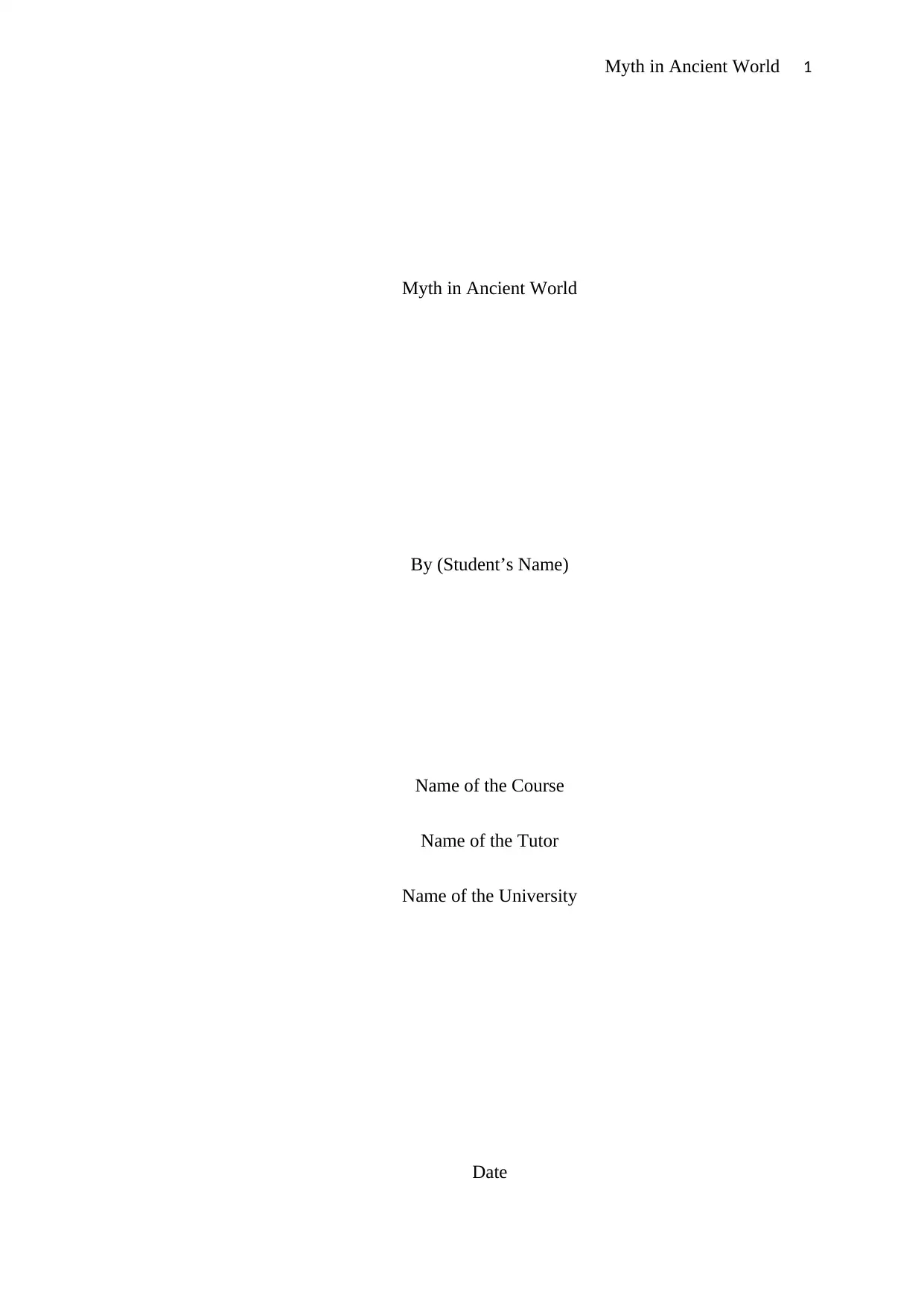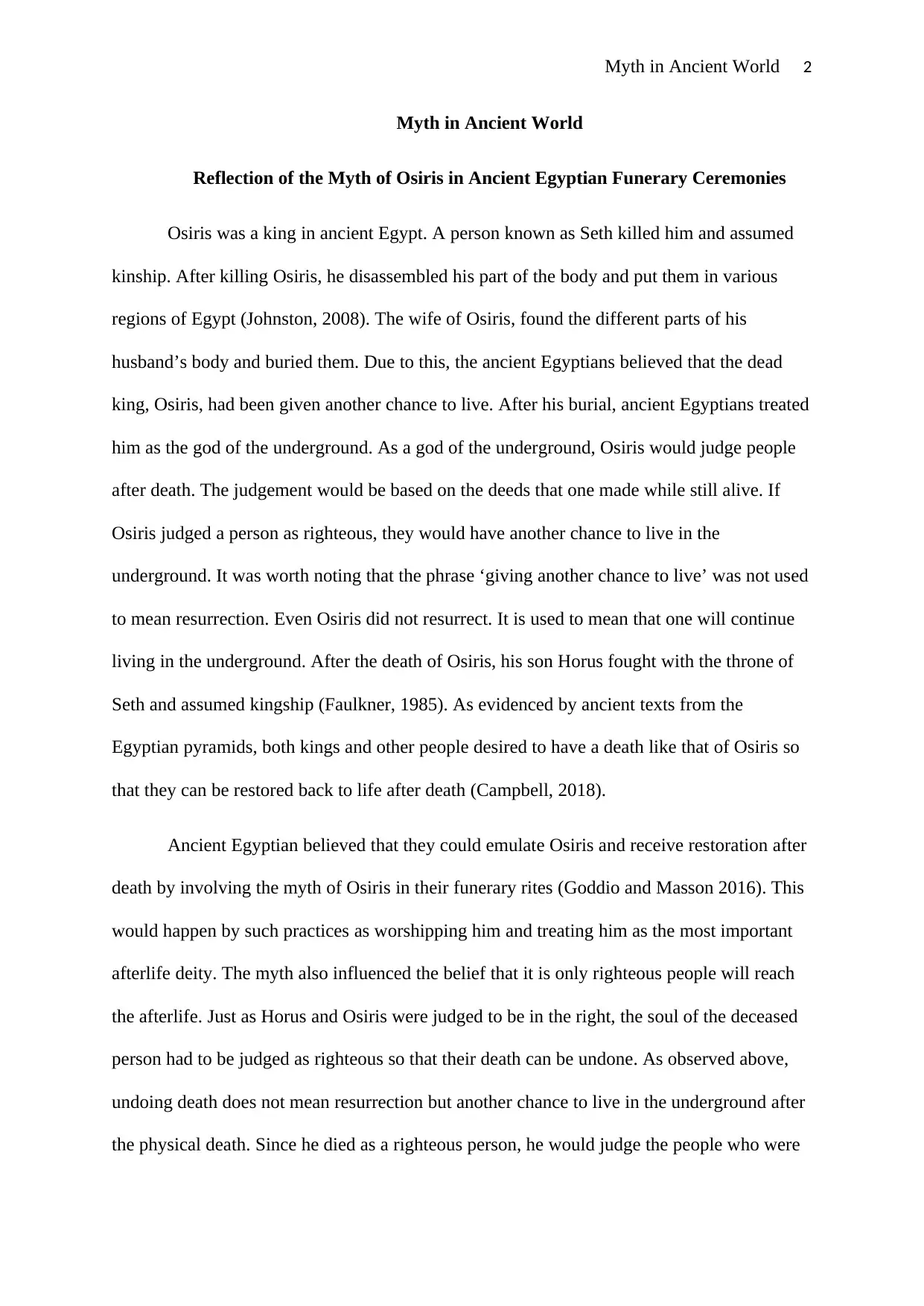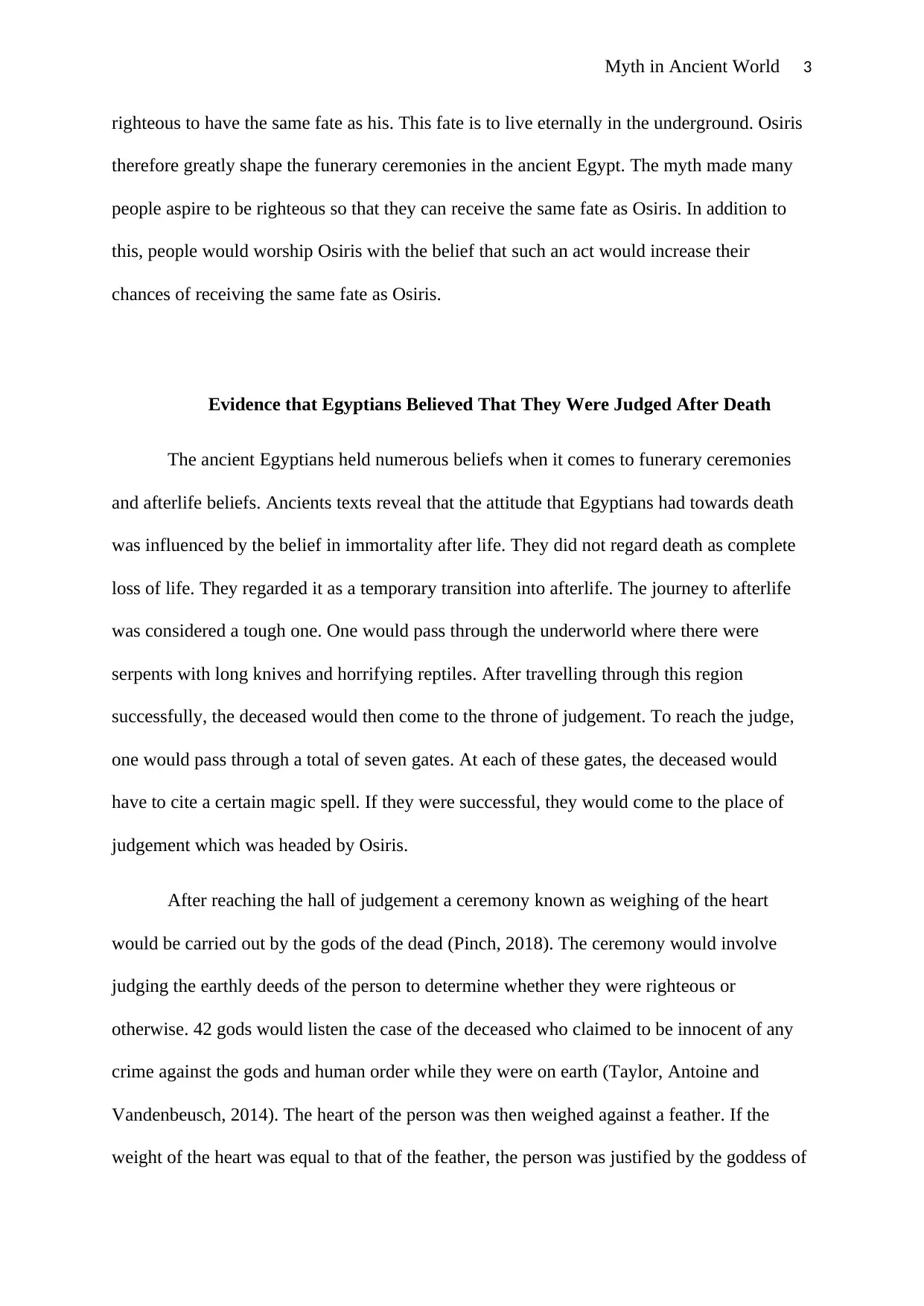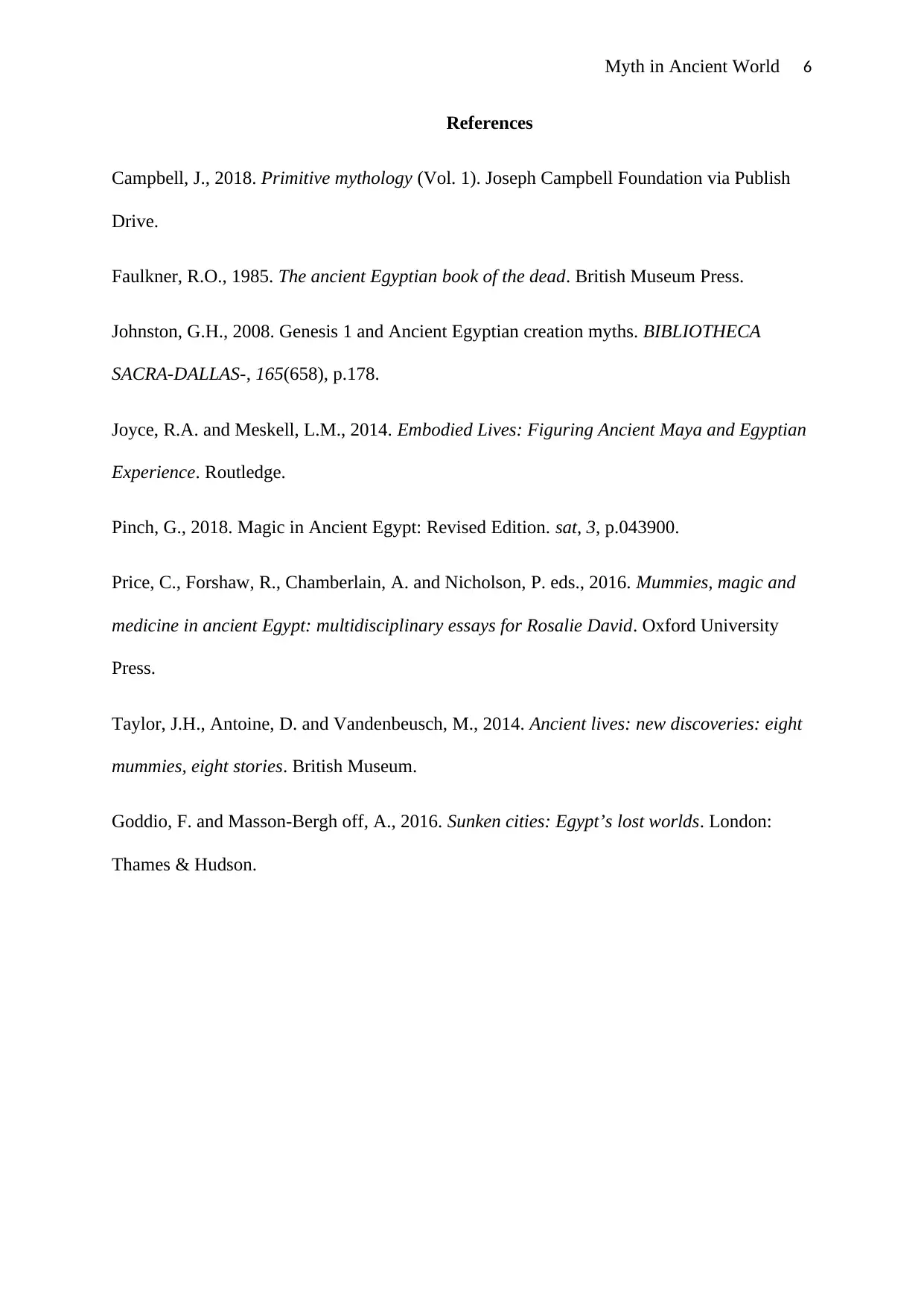Ancient Egyptian Funerary Customs: Reflection of Osiris Myth
VerifiedAdded on 2023/05/28
|6
|1395
|141
Essay
AI Summary
This essay examines the profound influence of the Osiris myth on ancient Egyptian funerary ceremonies, afterlife beliefs, and concepts of morality. It delves into how the myth of Osiris, his death, and subsequent role as the god of the underworld shaped Egyptian perceptions of death and the afterlife. The essay explores the reflection of the Osiris myth in funerary rites, highlighting practices such as worshipping Osiris and aspiring to righteousness to attain a favorable afterlife. It also analyzes evidence from ancient texts, particularly the Book of the Dead, demonstrating the Egyptian belief in judgment after death, where the deceased were assessed for their righteousness. The essay further discusses Egyptian ideas of morality, as revealed through spells and beliefs about magic, righteousness, and the consequences of actions in life, providing insights into the values and worldview of ancient Egyptian society. Desklib offers a wealth of resources for students, including past papers and solved assignments.

Myth in Ancient World 1
Myth in Ancient World
By (Student’s Name)
Name of the Course
Name of the Tutor
Name of the University
Date
Myth in Ancient World
By (Student’s Name)
Name of the Course
Name of the Tutor
Name of the University
Date
Paraphrase This Document
Need a fresh take? Get an instant paraphrase of this document with our AI Paraphraser

Myth in Ancient World 2
Myth in Ancient World
Reflection of the Myth of Osiris in Ancient Egyptian Funerary Ceremonies
Osiris was a king in ancient Egypt. A person known as Seth killed him and assumed
kinship. After killing Osiris, he disassembled his part of the body and put them in various
regions of Egypt (Johnston, 2008). The wife of Osiris, found the different parts of his
husband’s body and buried them. Due to this, the ancient Egyptians believed that the dead
king, Osiris, had been given another chance to live. After his burial, ancient Egyptians treated
him as the god of the underground. As a god of the underground, Osiris would judge people
after death. The judgement would be based on the deeds that one made while still alive. If
Osiris judged a person as righteous, they would have another chance to live in the
underground. It was worth noting that the phrase ‘giving another chance to live’ was not used
to mean resurrection. Even Osiris did not resurrect. It is used to mean that one will continue
living in the underground. After the death of Osiris, his son Horus fought with the throne of
Seth and assumed kingship (Faulkner, 1985). As evidenced by ancient texts from the
Egyptian pyramids, both kings and other people desired to have a death like that of Osiris so
that they can be restored back to life after death (Campbell, 2018).
Ancient Egyptian believed that they could emulate Osiris and receive restoration after
death by involving the myth of Osiris in their funerary rites (Goddio and Masson 2016). This
would happen by such practices as worshipping him and treating him as the most important
afterlife deity. The myth also influenced the belief that it is only righteous people will reach
the afterlife. Just as Horus and Osiris were judged to be in the right, the soul of the deceased
person had to be judged as righteous so that their death can be undone. As observed above,
undoing death does not mean resurrection but another chance to live in the underground after
the physical death. Since he died as a righteous person, he would judge the people who were
Myth in Ancient World
Reflection of the Myth of Osiris in Ancient Egyptian Funerary Ceremonies
Osiris was a king in ancient Egypt. A person known as Seth killed him and assumed
kinship. After killing Osiris, he disassembled his part of the body and put them in various
regions of Egypt (Johnston, 2008). The wife of Osiris, found the different parts of his
husband’s body and buried them. Due to this, the ancient Egyptians believed that the dead
king, Osiris, had been given another chance to live. After his burial, ancient Egyptians treated
him as the god of the underground. As a god of the underground, Osiris would judge people
after death. The judgement would be based on the deeds that one made while still alive. If
Osiris judged a person as righteous, they would have another chance to live in the
underground. It was worth noting that the phrase ‘giving another chance to live’ was not used
to mean resurrection. Even Osiris did not resurrect. It is used to mean that one will continue
living in the underground. After the death of Osiris, his son Horus fought with the throne of
Seth and assumed kingship (Faulkner, 1985). As evidenced by ancient texts from the
Egyptian pyramids, both kings and other people desired to have a death like that of Osiris so
that they can be restored back to life after death (Campbell, 2018).
Ancient Egyptian believed that they could emulate Osiris and receive restoration after
death by involving the myth of Osiris in their funerary rites (Goddio and Masson 2016). This
would happen by such practices as worshipping him and treating him as the most important
afterlife deity. The myth also influenced the belief that it is only righteous people will reach
the afterlife. Just as Horus and Osiris were judged to be in the right, the soul of the deceased
person had to be judged as righteous so that their death can be undone. As observed above,
undoing death does not mean resurrection but another chance to live in the underground after
the physical death. Since he died as a righteous person, he would judge the people who were

Myth in Ancient World 3
righteous to have the same fate as his. This fate is to live eternally in the underground. Osiris
therefore greatly shape the funerary ceremonies in the ancient Egypt. The myth made many
people aspire to be righteous so that they can receive the same fate as Osiris. In addition to
this, people would worship Osiris with the belief that such an act would increase their
chances of receiving the same fate as Osiris.
Evidence that Egyptians Believed That They Were Judged After Death
The ancient Egyptians held numerous beliefs when it comes to funerary ceremonies
and afterlife beliefs. Ancients texts reveal that the attitude that Egyptians had towards death
was influenced by the belief in immortality after life. They did not regard death as complete
loss of life. They regarded it as a temporary transition into afterlife. The journey to afterlife
was considered a tough one. One would pass through the underworld where there were
serpents with long knives and horrifying reptiles. After travelling through this region
successfully, the deceased would then come to the throne of judgement. To reach the judge,
one would pass through a total of seven gates. At each of these gates, the deceased would
have to cite a certain magic spell. If they were successful, they would come to the place of
judgement which was headed by Osiris.
After reaching the hall of judgement a ceremony known as weighing of the heart
would be carried out by the gods of the dead (Pinch, 2018). The ceremony would involve
judging the earthly deeds of the person to determine whether they were righteous or
otherwise. 42 gods would listen the case of the deceased who claimed to be innocent of any
crime against the gods and human order while they were on earth (Taylor, Antoine and
Vandenbeusch, 2014). The heart of the person was then weighed against a feather. If the
weight of the heart was equal to that of the feather, the person was justified by the goddess of
righteous to have the same fate as his. This fate is to live eternally in the underground. Osiris
therefore greatly shape the funerary ceremonies in the ancient Egypt. The myth made many
people aspire to be righteous so that they can receive the same fate as Osiris. In addition to
this, people would worship Osiris with the belief that such an act would increase their
chances of receiving the same fate as Osiris.
Evidence that Egyptians Believed That They Were Judged After Death
The ancient Egyptians held numerous beliefs when it comes to funerary ceremonies
and afterlife beliefs. Ancients texts reveal that the attitude that Egyptians had towards death
was influenced by the belief in immortality after life. They did not regard death as complete
loss of life. They regarded it as a temporary transition into afterlife. The journey to afterlife
was considered a tough one. One would pass through the underworld where there were
serpents with long knives and horrifying reptiles. After travelling through this region
successfully, the deceased would then come to the throne of judgement. To reach the judge,
one would pass through a total of seven gates. At each of these gates, the deceased would
have to cite a certain magic spell. If they were successful, they would come to the place of
judgement which was headed by Osiris.
After reaching the hall of judgement a ceremony known as weighing of the heart
would be carried out by the gods of the dead (Pinch, 2018). The ceremony would involve
judging the earthly deeds of the person to determine whether they were righteous or
otherwise. 42 gods would listen the case of the deceased who claimed to be innocent of any
crime against the gods and human order while they were on earth (Taylor, Antoine and
Vandenbeusch, 2014). The heart of the person was then weighed against a feather. If the
weight of the heart was equal to that of the feather, the person was justified by the goddess of
⊘ This is a preview!⊘
Do you want full access?
Subscribe today to unlock all pages.

Trusted by 1+ million students worldwide

Myth in Ancient World 4
truth and justice. The fate of such a person would be similar to the fate of Osiris (Price et al.
2016). Such a person would therefore receive immortality and would continue living in the
underground.
If a person failed the test, then they would be devoured by a god known as Amemet.
Failing the test meant that the person is not righteous. Such a person therefore did not have a
chance to continue living as an immortal being in the underworld. It follows that the ancient
Egyptians believed in judgement in the afterlife. The judgement would either lead to a person
being declared as righteous or a person being devoured and denied a chance of being
immortal.
Egyptian Ideas of Morality
One of the insights that one gets from the spells is that magic power was allowed in
ancient Egypt. In the modern world, most people associate such spells with negativity and
therefore immoral. In the contemporary world, it is believed that such magical powers are
only intended to perpetuate wrong doing. The spell on magical power therefore provides us
with important information regarding the ancient Egyptians. It was moral for these magical
spells to be used.
The spells also stipulate that knowing the name of something gives one the power
over it. Due to this, the book of the dead provides a numerous list of names of the gods that
an Egyptian would come across in the afterlife (Joyce and Meskell 2014). This also shows
that they believed in life after death. It was considered moral for one to be righteous while on
earth. This way, they would have an easy time after death. They would be accorded the
ability of being immortal and live in the underground. Therefore, righteousness was a great
virtue in the ancient Egypt society. We also learn that killing someone was considered
truth and justice. The fate of such a person would be similar to the fate of Osiris (Price et al.
2016). Such a person would therefore receive immortality and would continue living in the
underground.
If a person failed the test, then they would be devoured by a god known as Amemet.
Failing the test meant that the person is not righteous. Such a person therefore did not have a
chance to continue living as an immortal being in the underworld. It follows that the ancient
Egyptians believed in judgement in the afterlife. The judgement would either lead to a person
being declared as righteous or a person being devoured and denied a chance of being
immortal.
Egyptian Ideas of Morality
One of the insights that one gets from the spells is that magic power was allowed in
ancient Egypt. In the modern world, most people associate such spells with negativity and
therefore immoral. In the contemporary world, it is believed that such magical powers are
only intended to perpetuate wrong doing. The spell on magical power therefore provides us
with important information regarding the ancient Egyptians. It was moral for these magical
spells to be used.
The spells also stipulate that knowing the name of something gives one the power
over it. Due to this, the book of the dead provides a numerous list of names of the gods that
an Egyptian would come across in the afterlife (Joyce and Meskell 2014). This also shows
that they believed in life after death. It was considered moral for one to be righteous while on
earth. This way, they would have an easy time after death. They would be accorded the
ability of being immortal and live in the underground. Therefore, righteousness was a great
virtue in the ancient Egypt society. We also learn that killing someone was considered
Paraphrase This Document
Need a fresh take? Get an instant paraphrase of this document with our AI Paraphraser

Myth in Ancient World 5
immoral. Seth is regarded as immoral for killing king Osiris. King Osiris on the other hand is
regarded as just for he did not deserve his death.
immoral. Seth is regarded as immoral for killing king Osiris. King Osiris on the other hand is
regarded as just for he did not deserve his death.

Myth in Ancient World 6
References
Campbell, J., 2018. Primitive mythology (Vol. 1). Joseph Campbell Foundation via Publish
Drive.
Faulkner, R.O., 1985. The ancient Egyptian book of the dead. British Museum Press.
Johnston, G.H., 2008. Genesis 1 and Ancient Egyptian creation myths. BIBLIOTHECA
SACRA-DALLAS-, 165(658), p.178.
Joyce, R.A. and Meskell, L.M., 2014. Embodied Lives: Figuring Ancient Maya and Egyptian
Experience. Routledge.
Pinch, G., 2018. Magic in Ancient Egypt: Revised Edition. sat, 3, p.043900.
Price, C., Forshaw, R., Chamberlain, A. and Nicholson, P. eds., 2016. Mummies, magic and
medicine in ancient Egypt: multidisciplinary essays for Rosalie David. Oxford University
Press.
Taylor, J.H., Antoine, D. and Vandenbeusch, M., 2014. Ancient lives: new discoveries: eight
mummies, eight stories. British Museum.
Goddio, F. and Masson-Bergh off, A., 2016. Sunken cities: Egypt’s lost worlds. London:
Thames & Hudson.
References
Campbell, J., 2018. Primitive mythology (Vol. 1). Joseph Campbell Foundation via Publish
Drive.
Faulkner, R.O., 1985. The ancient Egyptian book of the dead. British Museum Press.
Johnston, G.H., 2008. Genesis 1 and Ancient Egyptian creation myths. BIBLIOTHECA
SACRA-DALLAS-, 165(658), p.178.
Joyce, R.A. and Meskell, L.M., 2014. Embodied Lives: Figuring Ancient Maya and Egyptian
Experience. Routledge.
Pinch, G., 2018. Magic in Ancient Egypt: Revised Edition. sat, 3, p.043900.
Price, C., Forshaw, R., Chamberlain, A. and Nicholson, P. eds., 2016. Mummies, magic and
medicine in ancient Egypt: multidisciplinary essays for Rosalie David. Oxford University
Press.
Taylor, J.H., Antoine, D. and Vandenbeusch, M., 2014. Ancient lives: new discoveries: eight
mummies, eight stories. British Museum.
Goddio, F. and Masson-Bergh off, A., 2016. Sunken cities: Egypt’s lost worlds. London:
Thames & Hudson.
⊘ This is a preview!⊘
Do you want full access?
Subscribe today to unlock all pages.

Trusted by 1+ million students worldwide
1 out of 6
Your All-in-One AI-Powered Toolkit for Academic Success.
+13062052269
info@desklib.com
Available 24*7 on WhatsApp / Email
![[object Object]](/_next/static/media/star-bottom.7253800d.svg)
Unlock your academic potential
Copyright © 2020–2025 A2Z Services. All Rights Reserved. Developed and managed by ZUCOL.

